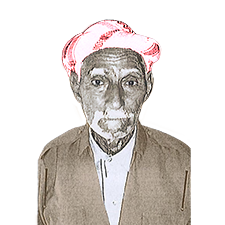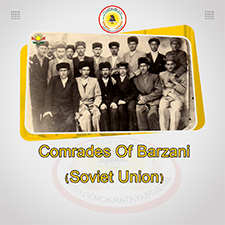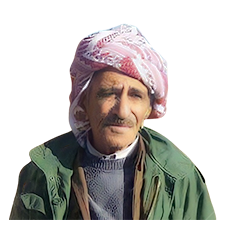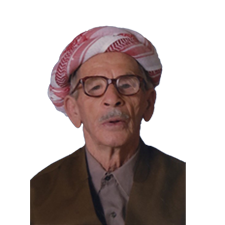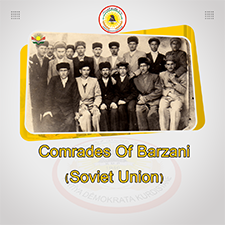biography
Suleyman Hado Zarari was born in 1930 in Zarara village in Goratu sub district in Mergasor district in Erbil province. He studied in the Soviet Union. In 1954 he received a bachelor's degree in the Soviet Union's Department of Agriculture. In the Soviet Union, he married Valania, he had experience in Kurdish, Arabic and Russian languages, and he passed away on the 4th of December 2014.
Memoir of Struggle
In 1943, he contacted the Second Revolution of Barzan and participated in the wars, and on August 19, 1945, by the order of the Iraqi Military Court, all of his moveable and immoveable properties were seized. After the failure of Second Barzan Revolution, which took place in eastern Kurdistan on 11 October 1945, on March 31, 1946, the Barzan forces of the Kurdistan Democratic army on Mahabad became peshmerga, and on March 31, 1946, he participated in the War of Qarwa in the Saqiz area.
After the collapse of Kurdistan Democratic Republic, on March 19, 1947, he participated in the Battle of Naghda and Shno, and was one of the Peshmerga who returned to The Sherwan and Mazuri area on 19 April 1947 through the khwakurk and the Barazgrawa plains.
After their return, General Mustafa Barzani held a meeting with his comrades in Argosh village on May 15, 1947, and allows them to choose to stay, or go to the Soviet Union, where all his comrades decided to continue and go to the Soviet Union. On May 23, 1947, he accompanied General Mustafa Barzani to the Soviet Union and participated in the Battle of the stream of Qatur and the Battle of the Mako Bridge. After hardships and hardwork he crossed the Aras River, which is located in the border between Iran and the Soviet Union, he crossed into the Soviet Union.
After their arrival in the Soviet Union, on June 19, 1947, he was placed with all his comrades in the city of Nakhchawan of the Republic of Azerbaijan for forty days in a deserted community surrounded by barb wire and guarded by a group of soldiers and regarding food, clothing, and mobility were treated as prisoners of war. Later, on the decision of the Soviet government, they were distributed over the areas of Aghdam, Lachin, Aywlakh and Kalbajar in the republic of Azerbaijan. On December 10, 1947, they were transferred to a military base on the Khazar Sea in The Capital of Azerbaijan, Baku, and on the 23th of the same month, they were given military uniforms and were trained eight hours a day under the supervision of Azerbaijani officers. At the same time, for four hours a day, they were taught Kurdish language lessons by the comrades who were literate.
After Jafar Bagrov's ill treatment of his comrades, Barzani decides to move his military camp from Azerbaijan to The Chirchik community in Near Tashkent, the capital of Uzbekistan, where they will continue their military training.
In March 1949, he and his friends were distributed as groups into the villages of the Soviet Union by train and worked in the Kulkhoz farms (land that people rented from the government and then paid back the government share).
After much effort and many letters sent by General Barzani to Stalin, a letter finally arrives in Stalin's hand in which Barzani discusses the problems of his comrades and Stalin immediately decides to form a committee to investigate the situation of Barzani's comrades, and finally the committee's decision is to gather them all in the city of Vrivski، so he will go to the Soviet city of Vrivski in November 1951.
Following the revolution of July 14, 1958 in Iraq and the return of General Mustafa Barzani, on February 25, 1959, in accordance with both Third and Seventh Articles and section (A) of Article Ten working with article 11, in accordance with the amended law No. 19 of 1959, he and his comrades were subjected to general amnesty.
In 1958, the Republic of Iraq was established under the presidency of Abd al-Karim Qasim, the aforementioned returned to Kurdistan on April 16, 1959, with his friends on the Groza ship via Basra port in the south of the republic of Iraq.
In 1961, he participated in the September Revolution, participated in the Battle of Pers, Goraz, and Handren Mountain, in 1963 he participated in the Battle of Shorish and Sharmna, and on the way of 14 on 15 June 1963 he participated in the Battle of Akre, in 1974 he was in the Revolutionary Artillery Unit, in 1975 after the failure of September Revolution. In 1981, the Iraqi regime burned down his village and went to the Islamic Republic of Iran as a refugee and settled in the Zewa community. In 1983, he participated in the Gulan Revolution, returned to Kurdistan in 1991 and settled in Zrara village, retired in 1993, on the 16th of May 2010 in the 13th Congress of the Kurdistan Democratic Party because of the struggle and endeavor in the Second Revolution of Barzan, the Democratic Republic of Kurdistan, his path towards the Soviet Union, the September Revolution and the Gulan Revolution, was awarded the Barzani Medal by President Masoud Barzani.
Sources:
-
حامید گهوههری، میدالیای بارزانی بهرزترین خهڵاتی ڕێزلێنان، بهرگی یهكهم، (ههولێر - چاپخانهی حاجی هاشم - ٢٠١٥ز).
-
حیدر فاروق السامرائي، ضیاء جعفر ودوره السیاسي و الاقتصادي في العراق، (لندن – دار الحكمة - 2016م).
-
شهعبان عهلی شهعبان، ههندێك زانیاری سیاسی و مێژوویی، چاپی سێیهم، (ههولێر - چاپخانهی رۆژههڵات - 2013ز).
-
عمر فاروقی، سردار دانا زندگی و مبارزات مرحوم ملا مصطفی بارزانی، چاپ دوم، (ههولێر - چاپخانهی وزارت آموزش و پرورش - 2002ز).
-
عهبدولڕهحمان مهلا حهبیب ئهبوبهكر، عهشیرهتی بارزان له نێوان 1931 - 1991، چاپی یهكهم، (ههولێر - چاپخانهی وهزارهتی رۆشنبیری - 2001ز).
-
عهبدولڵا غهفور، فهرههنگی جوگرافیای ههولێر، (ههولێر - بڵاوكراوهكانی ئهكادیمیای كوردی - چاپخانهی حاجی هاشم - 2015ز).
-
كاروان محهمهد مهجید، بارزانییهكان له مههابادهوه بۆ سۆڤێت، چاپی یهكهم، (سلێمانی - چاپخانهی پهیوهند - 2011ز).
-
گۆڤاری ههتاو، ژماره 154، ساڵی شهشهم، ههولێر، چاپخانهی كوردستان، ههینی، 15 نیسانی 1959.
-
له یادداشتی فهرماندهی شههید حهسۆ میرخان ژاژۆكی، 62 رۆژ لهگهڵ بارزانی دا چوونی بارزانییهكان بۆ یهكێتی سۆڤێت، چاپی یهكهم (ههولێر - چاپخانهی رۆشنبیری - 1997ز).
-
لیث عبدالمحسن جواد الزبیدي، ثورة 14 تموز 1958 في العراق، (بغداد - دارالرشید للنشر - 1979م).
-
مسعود بارزانی، بارزانی و بزوتنهوهی رزگاریخوازی كورد 1931 - 1958، (دهۆك - چاپخانهی خهبات - 1998ز).
-
مسعود بارزانی، بارزانی و بزوتنهوهی رزگاریخوازی كورد 1961 - 1975، بهرگی سێیهم، بهشی یهكهم، (ههولێر - چاپخانهی وهزارهتی پهروهرده - 2004ز).
-
ئـ.د.ئـ، فایلی ژماره AI-10، لیستی ههڤاڵانی مستهفا بارزانی بۆ یهكێتی سۆڤێت، بهڵگهنامه لهلایهن سهگڤان هاڵۆ پێشكهش كراوه، 2016ز.
-
ئـ.د.ئـ، فایلی ژماره AN-4، بەڵگەنامەى ژیاننامهی سلێمان حەدۆ شینۆ زراری، لهلایهن عادل سلێمان حهدۆ پێشكهش كراوه، پیرمام، 18 شوباتی 2019ز.
-
ئـ.د.ئـ، فایلی ژماره HB-426، پارتی دیموكراتی كوردستان، بارهگای بارزانی، لێژنهی باڵای ناوچهی بارزان، فۆرمی سلێمان حەدۆ شینۆ، پیرمام، 1 تشرینی دووهمی 2018ز.
-
ئـ.د.ئـ، فایلی ژماره ZB-116، دهقی چاوپێكهوتن لهگهڵ عادل سلێمان حهدۆ لهلایهن نهزیره مێرگهسۆری، پیرمام، 18 شوباتی 2019ز.




